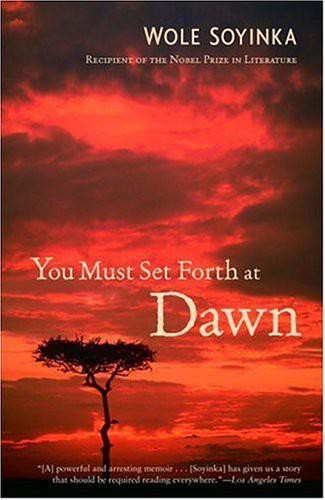
You Must Set Forth at Dawn
A Memoir
کتاب های مرتبط
- اطلاعات
- نقد و بررسی
- دیدگاه کاربران
نقد و بررسی

Starred review from February 27, 2006
In this engrossing follow-up to his acclaimed childhood memoir, Aké
, the Nigerian poet, playwright and Nobel laureate demonstrates what it means to be a public intellectual. Soyinka revisits a tumultuous life of writing and political activism, from his student days in Britain through his struggles, sometimes from prison or exile, against a succession of Nigerian dictatorships. Soyinka may be on a first-name basis with almost every major Nigerian figure and he's sometimes involved in high-level intrigues; his chronicle of political turmoil is very personal, full of sharply drawn sketches of comrades and foes, and cantankerous rejoinders to critics. His novelistic eyewitness accounts of repression and upheaval widen out from time to time to survey the humiliation and corruption of Nigerian society under military rule. Soyinka also includes recollections of friends and family, of sojourns abroad with W.H. Auden and other literati and of stage triumphs and fiascoes. His lyrical evocations of African landscapes, the urban nightmare of Lagos, the horrors of British cuisine and the longing a dusty fugitive feels for a cold beer will entertain and educate readers. By turns panoramic and intimate, ruminative and politically resolute, Soyinka's memoir is a dense but intriguing conversation between a writer and his times.

May 1, 2006
Nigerian Nobel laureate Soyinka here continues his story that began in: "Ake The Years of Childhood "(1982). A political activist, as well as a poet and playwright ("Climate of Fear"), Soyinka reflects on his adult life in turbulent postcolonial Nigeria. Since that country gained independence from Great Britain in 1960, a series of governments has kept Nigeria dangerous and unstable. Soyinka's untiring efforts to bring democracy and freedom to his homeland resulted in his arrest in 1967, when he was accused of conspiring with the Biafra rebels and imprisoned for two years, along with several periods of exile. While Nigerian politics dominates the book, Soyinka shares some amusing anecdotes, too, such as his problem with the climate in Boston, which he refers to as the -Arctic wastes. - He also discusses the dual meaning of the Nobel prize, which he won in 1986: he is honored to be chosen (he was the first African to win the prize) yet is aware of the price to be paid in loss of privacy and obligations to the public. Soyinka's lyrical accounts of Africa's natural beauty, his eyewitness chronicle of political intrigue, and his forceful voice for human rights and democracy make this an important book for our time. Strongly recommended for all collections." -Nancy R. Ives, SUNY at Geneseo"
Copyright 2006 Library Journal, LLC Used with permission.

March 15, 2006
As much a political history of contemporary Nigeria as an autobiography, this candid memoir by the Noble Prize winner begins after the death of the vicious dictator Sani Abacha in 1998, when Soyinka returned home from five years in exile. Then he goes back and forth in time, remembering and reflecting on his role as writer and political activist in Nigeria and across the world. Outraged by the chaos in Nigeria after the fight for independence from Britain in 1960--corruption and violence, coups, countercoups, assassinations, massacres--he is neither self-righteous nor simplistic as he confronts the political reality. "Purity is an unaffordable luxury." But how much do you compromise? "How long is the spoon for dining with the devil and how do you keep a firm hold on it?" There is not much about Soyinka's family life here and only just a glimpse of his own two years in solitary detention without trial, which he chronicled in " The Man Died: Prison Notes of Wole Soyinka " (1972). But there is vivid detail about his close political friendships, including his meetings with great activists, such as Nelson Mandela (to whom Soyinka dedicated his Nobel speech). With the passionate close-up view of the past and the valuable insights, many of them highly critical, about today's leaders, this is a must for anyone concerned with human rights\b \b0 and the global web of oil, poverty, and corruption. (Reprinted with permission of Booklist, copyright 2006, American Library Association.)

























دیدگاه کاربران